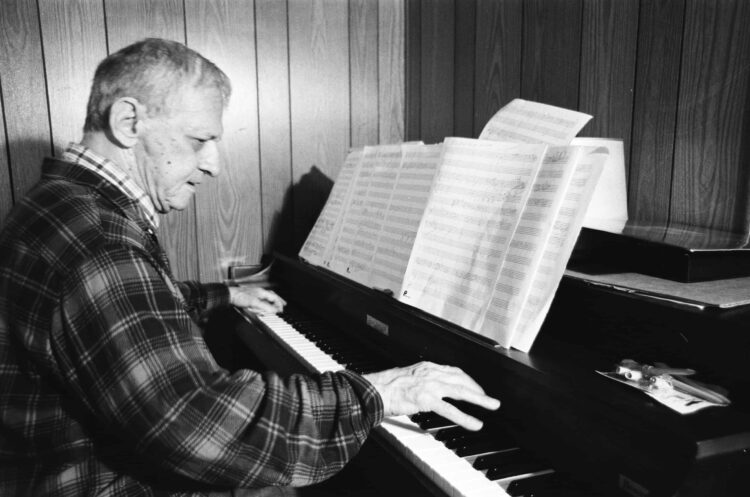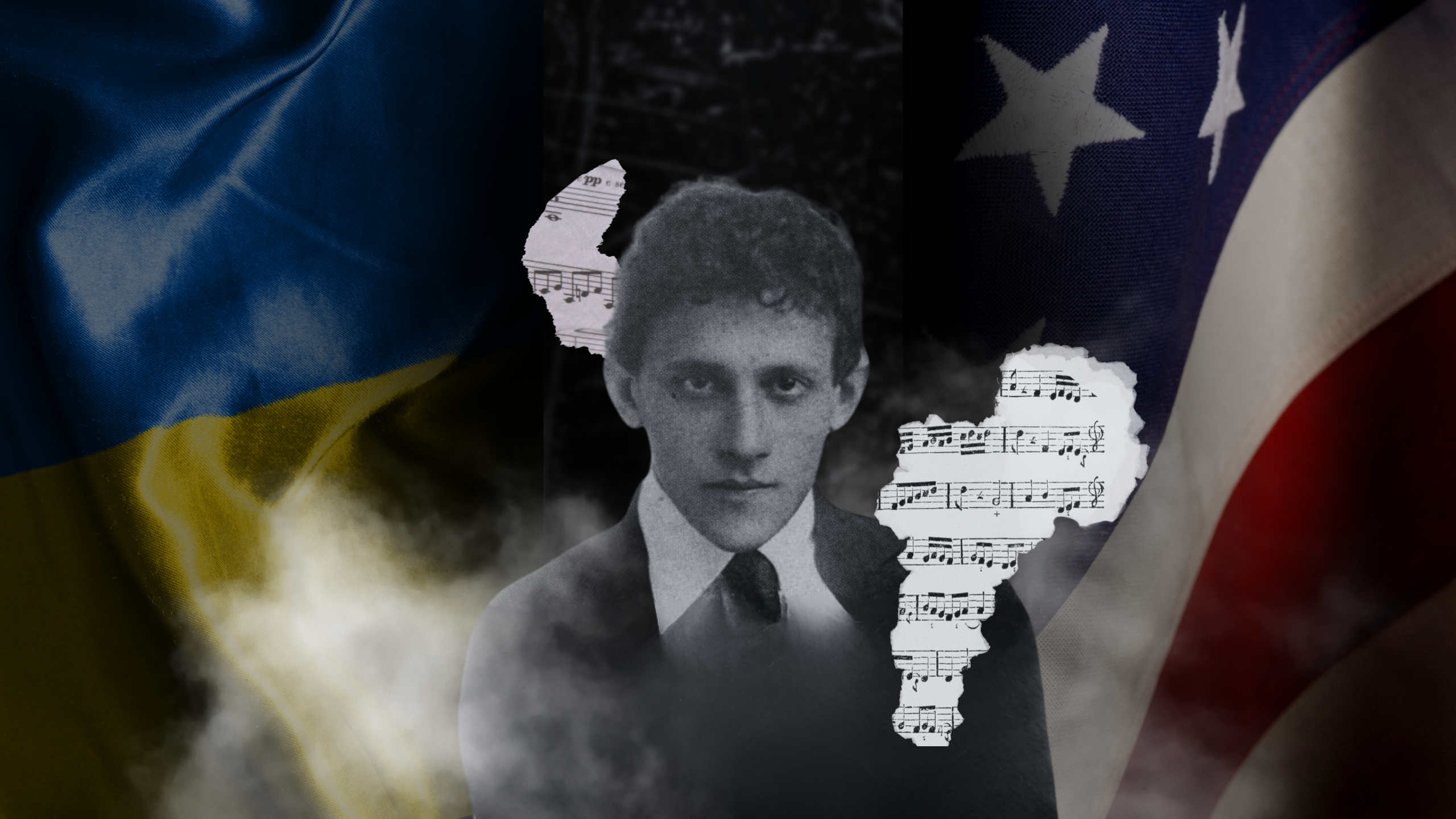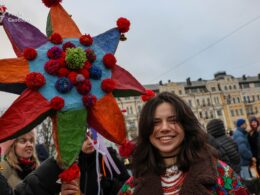Ukraine’s cultural heritage and contributions to global art are being rediscovered and celebrated despite daily air raid sirens, bombardments, and the ongoing war.
One special event will connect audiences with a forgotten masterpiece and highlight the country’s contributions when Leo Ornstein’s Piano Concerto premieres on 26 January at the Lviv Organ Hall. Performed by pianist Roman Repka and the Luhansk Philharmonic Symphony Orchestra under the direction of Ivan Ostapovych, this avant-garde work blends modernist harmonies with deep emotional expression.
Leo Ornstein was a Ukrainian-born, Jewish-American composer and pianist, whose life and work reflect Ukraine’s enduring ties to the arts.
The Composer
Born in Kremenchuk, Poltava Oblast, in 1893, Ornstein displayed talent from a young age. Encouraged by his father, a Jewish cantor, and his violinist uncle, Ornstein first trained at Kyiv’s Imperial School of Music. In those days, in order to progress, Ukrainian artists had little choice but to study in Russia. In 1904, the nine-year-old Ornstein, therefore, took up residence at the St. Petersburg Conservatory.

Amidst the turmoil of the 1905 Russian Revolution, Ornstein’s family emigrated to New York, where he won a scholarship to the Institute of Musical Art, the precursor to Juilliard. Ornstein eventually gained renown as a “Futurist” pianist, shocking audiences with his daring compositions that combined emotional expressiveness with avant-garde innovation.
On 27 March 1914, in London, Leo Ornstein gave his first public performance of what were then termed "Futurist" works, now recognized as Modernist. The program included an arrangement of three Bach chorale preludes, several pieces by Arnold Schoenberg, and a selection of Ornstein’s own avant-garde compositions.
The concert provoked a strong and polarized reaction. Some critics were scathing in their assessments, with one newspaper condemning Ornstein’s compositions as “the sum of Schoenberg and Scriabin squared.” Another described the performance with disdain: “We have never suffered from such insufferable hideousness, expressed in terms of so-called music.”
Despite the controversy, the concert marked Ornstein as a significant figure in the evolving world of Modernist music, challenging traditional norms and redefining the boundaries of composition and performance.

A visionary of his time, Ornstein and his works, though once celebrated in Europe and the US between 1915 and the early 1920s, faded into obscurity until recent years.
Ornstein’s Piano Concerto is a compelling piece, weaving dramatic surges with lyrical tenderness. This performance requires both virtuosic skill and interpretive depth. Alongside the Luhansk Philharmonic, under Ostapovych’s direction, pianist Roman Repka will bring Ornstein’s complex, expressive language to life.
The concert, hosted in Lviv, represents a significant homecoming for Ornstein, a composer who influenced the evolution of musical modernism and inspired generations.
The Pianist
Roman Repka is a renowned Ukrainian pianist, educator, and advocate for rediscovering forgotten music. A graduate of the National Music Academy of Ukraine, under Professor Valerii Kozlov, he balances a performing career with teaching at institutions such as the Mykola Lysenko Kyiv Specialized Music School, the Glinka Dnipro Music Academy, Hannan Pedagogical University in China, and the Revutskyi Children’s Music School No. 5, in Kyiv.

Repka has led cultural projects such as Music as a Language and The Discovery of Carl Czerny, highlighting lesser-known works and historical contexts. As a soloist and repertoire director for the New Era Orchestra, he collaborates with ensembles while focusing on rare masterpieces.
In 2011, he revived Levko Revutskyi’s lost Piano Concerto, returning it to Ukrainian audiences after decades. His repertoire includes works by Carl Czerny, Joaquín Rodrigo, and Michael Nyman, showcasing his dedication to preserving and promoting Ukraine’s and Europe’s musical heritage.
The Conductor
Ivan Ostapovych, conductor, composer, and director of the Lviv Organ Hall, is a key figure in Ukrainian classical music. He co-founded the Ukrainian Festival Orchestra and leads the Academic Symphony Orchestra of the Luhansk Philharmonic.

As co-founder of Collegium Management and artistic director of Ukrainian Live, a project promoting Ukrainian music recognized by the European Festivals Association, he has spearheaded initiatives like the LiudkevychFest festival and the Ukrainian Live Classic mobile app.
Ostapovych has conducted renowned ensembles such as the Malmo Academic Symphony Orchestra and Lviv National Philharmonic, among others. He has premiered works by Ukrainian composers, including Stefaniia Turkevych, Mykhailo Verbytskyi, and Bohdana Froliak, bringing these pieces to international audiences. His leadership has shaped Ukraine’s music scene through innovative festivals, residencies, and global collaborations, spotlighting Ukraine’s cultural heritage on the world stage.
The Orchestra
The Academic Symphony Orchestra of the Luhansk Regional Philharmonic is a vital force in Ukrainian culture and a guardian of the artistic heritage of its temporarily occupied region.
Founded in Luhansk, it staged operas such as La Traviata and The Barber of Seville in its early years and has long championed Ukrainian composers like Andrii Shtoharenko and Myroslav Skoryk.
After the outbreak of war in eastern Ukraine in 2014, the orchestra relocated to Sievierodonetsk under the leadership of director Ihor Shapovalov, swiftly resuming collaborations with Ukrainian and European artists. In 2022, with Russia’s full-scale invasion, directors Ivan Ostapovych and Taras Demko of the Lviv Organ Hall facilitated the orchestra’s evacuation to Lviv, where it continues its mission.

Now based at the Lviv Organ Hall, the orchestra presents new programs, premieres works by Ukrainian composers, and collaborates with choirs and soloists. Performances are shared via the Ukrainian Live Classic YouTube channel, expanding its reach. The Luhansk Orchestra remains a cultural pillar, preserving the identity and heritage of its temporarily occupied region while contributing to Ukraine’s broader cultural landscape.
Lviv Organ Hall
These cultural initiatives act as a form of soft power, enhancing Ukraine’s global presence and portraying it as a nation of creativity and innovation, even in times of war. This fosters support and recognition from the global community while securing Ukraine’s cultural legacy for future generations.
The Ukrainian Live project, launched in 2019 by the enthusiastic team at Lviv Organ Hall, plays a key role in reviving and presenting Ukraine’s musical legacy.

Its mission is to rediscover forgotten artists, restore lost classics, and bring overlooked cultural figures back into the spotlight. Through innovative programming that integrates music, history, and visual art, the Lviv Organ Hall creates a modern cultural hub for local and international audiences.
Cultural Reclamation
The Lviv Organ Hall team firmly believes that promoting Ukrainian culture during the war serves multiple purposes. It strengthens national identity and unity, offering resilience against external aggression, says conductor Ivan Ostapovych. Highlighting Ukraine’s artistic and cultural heritage also counters disinformation and challenges narratives that undermine the country’s sovereignty and historical significance.
Taras Demko, vice-director of the Lviv Organ Hall, underlines that “reclaiming and promoting Ukrainian culture builds international solidarity and raises awareness of Ukraine’s contributions to art, music, literature, and history.” By ensuring that Ukraine’s cultural legacy is preserved, the Lviv Organ Hall team prevents the war from overshadowing or erasing its historical and creative achievements.
RELATED:
- Lviv’s Forbidden Music project proves totalitarian regimes cannot control people’s minds – Swedish composer
- Ukraine launches official account on Spotify
- Ukrainian music forbidden under Soviets comes to limelight in international project
- Kyiv is becoming the world’s music video capital: 12 iconic clips
- Beyond Go_A: a playlist and guide to modern Ukrainian folk music
- The secret of Kateryna Pavlenko, Ukraine’s enigmatic Eurovision singer
- Phone app brings 40 Ukrainian classical composers into your pocket
- Bondi Vesolovsky and Yabtso Jazz: swinging Lviv in the 1920s-30s





